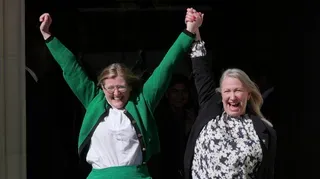December 20, 2011
Fertile Sperm Donor Draws Criticism From FDA, Docs
Jason St. Amand READ TIME: 4 MIN.
Physicians and the federal government cited the case of a San Francisco Bay area man who has fathered 14 children as an example of the risks posed by the informal market for sperm donations, which doctors consider unsafe but some people call a civil liberties issue.
Trent Arsenault, 36, of Fremont offers his sperm for free to women he meets through his website. In addition to the 14 already born, he says four more are on the way. In the meantime, he is contesting a U.S. Food and Drug Administration order to cease and desist.
While sperm bank donors remain nameless and some men offer their sperm through anonymous ads on Craigslist, Arsenault's site is filled with photographs of the trim, blond Midwest native. In its letter, the agency describes Arsenault's service as a business. Arsenault disagrees.
"This is not a business or a clinic. It's just people partnering up to have a baby out of compassion," he said.
Arsenault says he donates sperm out of a sense of service to help people who want to have children but can't afford conventional sperm banks. The 36-year-old minister's son has four more children on the way.
"I always had known through people praying at church that there's fertility issues," Arsenault told The Associated Press. "I thought it would just be a neat way of service to help the community."
The FDA sent Arsenault the letter late last year telling him he must stop because he does not follow the agency's requirements for getting tested for sexually transmitted diseases within seven days before giving sperm. The FDA did not immediately respond to requests for comment.
Violators of FDA regulations on human cells and tissues face up to a year in prison and a $100,000 fine, according to guidelines published on the agency's website.
Arsenault gets tested regularly, but following the FDA's rules would make it impossible to keep offering his sperm for free, he said.
"The regulations may be little bit strict, but I think that's appropriate," said Dr. Mitchell Rosen, director of the University of California, San Francisco Fertility Preservation Center.
Rosen said it's not uncommon for women to use donated sperm from someone they know. But trusting a donor who is being honest about his background is no substitute for screening for diseases that could be passed on to the mother or child, he said.
A sperm bank will also isolate the actual sperm cells from the donor's semen, which reduces the risk of passing along pathogens, Rosen said. "In this situation there's no reduction of risk. It's just as if they're going out and having a one night stand."
At the time of the FDA letter, the Silicon Valley computer security specialist had made 328 sperm donations to 46 women, a number he said is now higher. He can continue to donate sperm while the case is pending.
Experts say the volume of sperm donations by Arsenault creates risks for future generations. They say the greater the number of children, the greater the chances of spreading a genetic defect. Children who don't know they're related could also unwittingly have sex, though unlike the anonymous sperm donor system used by sperm banks, Arsenault keeps careful track of his offspring.
"There's a danger of accidental incest or inbreeding if you're the father of 14 children" and a habitual sperm donor, said bioethicist Arthur Caplan at University of Pennsylvania. "Nobody should be involved as a sperm donor on that level. It's not safe."
Caplan said the FDA may have a tough time asserting its authority over this kind of informal activity, though. Other medical experts think the agency may have a case since it deals with the safety of public health.
"He should not be allowed to do it unless he gets himself tested" and follow the same rules as sperm banks, said Dr. Stanley Korenman, associate dean of ethics at the UCLA David Geffen School of Medicine.
The difference between asking a friend to donate sperm and the San Francisco case is a matter of volume, experts says.
"This guy is doing it commercially. He's turning out a lot of babies. If you have a friend doing it once or twice it's not a big deal," Korenman said.
The oldest child Arsenault has fathered is now 4. He and the recipients, whom he describes as "intimate partners," sign a legal agreement ahead of time stripping him of any custody rights and absolving him of any financial responsibility for the children.
But he says that part of the reason of making himself publicly visible as a sperm donor rather than remaining anonymous, as is typical with sperm banks, is because he and some of the families hope and expect he will have some involvement in the children's lives in the future.
He says he believes his case comes down to constitutional issues of a right to privacy and reproductive choice.
"It's not that much more different than a couple knowing each other who want to have a baby," Arsenault said. "It's just from me it comes in a cup versus sex."





